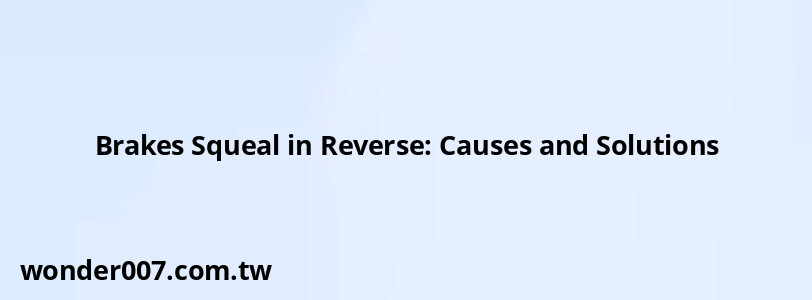Brakes Squeal in Reverse: Causes and Solutions
235
0

Experiencing squealing brakes when reversing, especially in cold weather, can be a common issue for many drivers. This phenomenon typically occurs due to several factors related to the brake system's performance and environmental conditions. Understanding these causes can help you address the problem effectively.
Common Causes of Brake Squeal in Reverse
- Moisture Accumulation: Overnight moisture can create a thin layer of rust on the brake rotors. This rust can cause squeaking noises when the brakes are first engaged, particularly when reversing. The noise usually dissipates after a few applications of the brakes as the rust is worn away.
- Brake Pad Material: Certain materials used in brake pads, especially those that are more environmentally friendly, may be prone to squeaking when cold. For instance, ceramic pads often produce noise until they reach optimal operating temperature.
- Debris and Dust: Accumulation of dust or debris between the brake pads and rotors can lead to squealing sounds. This is especially true if the vehicle has been parked for an extended period.
- Lack of Lubrication: Insufficient lubrication on the brake components, including shims and caliper slides, can result in noise. Proper lubrication helps minimize movement and vibration that contribute to squeaking.
- Brake Glazing: If brake pads become glazed due to excessive heat or improper bedding, they may produce noise when cold. Bedding refers to the process of properly seating new brake pads against the rotors.
Solutions to Reduce Squealing
- Regular Brake Maintenance: Ensure that your brakes are regularly inspected and maintained. Cleaning the brake components during routine service can help remove any debris or dust buildup.
- Bedding In New Pads: If you have recently replaced your brake pads, consider bedding them properly. This involves applying a series of hard stops from moderate speeds to ensure they seat correctly against the rotors.
- Use Quality Brake Pads: Upgrading to higher-quality brake pads designed for low noise can significantly reduce squealing. Look for pads specifically engineered to minimize sound.
- Lubrication: Apply anti-squeal lubricant on the back of the brake pads and ensure that all moving parts are adequately lubricated to prevent noise from friction.
- Indoor Parking: Whenever possible, park your vehicle indoors to avoid moisture accumulation overnight, which can lead to rust formation on the rotors.
FAQs About Brake Squeal in Reverse
FAQs About Brakes Squeal in Reverse
- Why do my brakes squeak only when reversing?
This is often due to moisture causing rust on the rotors or specific pad materials that are more prone to noise when cold. - Is it safe to drive with squeaky brakes?
While squeaking is usually not a safety issue, it indicates that maintenance may be needed. Ignoring it could lead to more significant problems. - How can I stop my brakes from squeaking?
Regular maintenance, using quality brake components, and ensuring proper lubrication can help minimize or eliminate squeaking.
By understanding the reasons behind your brakes' behavior and implementing these solutions, you can effectively manage and reduce unwanted noise while ensuring your vehicle remains safe and functional.
Related Posts
-
Toyota Camry Car Alarm Issues: Causes and Fixes
27-01-2025 • 331 views -
2014 GMC Sierra Tailgate Won't Open: Troubleshooting and Solutions
27-01-2025 • 214 views -
Honda Pilot Key Stuck in Ignition: Causes and Solutions
27-01-2025 • 220 views -
Kia Sorento Battery Discharge Warning: Causes & Fixes
26-01-2025 • 289 views -
2001 Ford F150 Blend Door Actuator: Troubleshooting and Solutions
28-01-2025 • 241 views
Latest Posts
-
Rear Brake Caliper Piston Won't Compress
01-02-2025 • 432 views -
2015 Chevy Traverse AC Recharge Port Location
01-02-2025 • 499 views -
How To Turn Off Paddle Shifters Mercedes
01-02-2025 • 473 views -
Are O2 Sensors Covered Under Warranty
01-02-2025 • 456 views -
Power Steering Fluid Leak On Passenger Side
01-02-2025 • 546 views
Popular Posts
-
BMW X5: Fuel Tank Capacity and Specifications
28-01-2025 • 742 views -
Toyota Hiace: Fuel Efficiency Insights for 2025
26-01-2025 • 815 views -
Hino Warning Lights: Understanding Dashboard Alerts
26-01-2025 • 966 views -
V12 Engine Costs: What You Need to Know
26-01-2025 • 786 views -
EPC Light: Understanding Causes and Solutions
26-01-2025 • 1157 views
